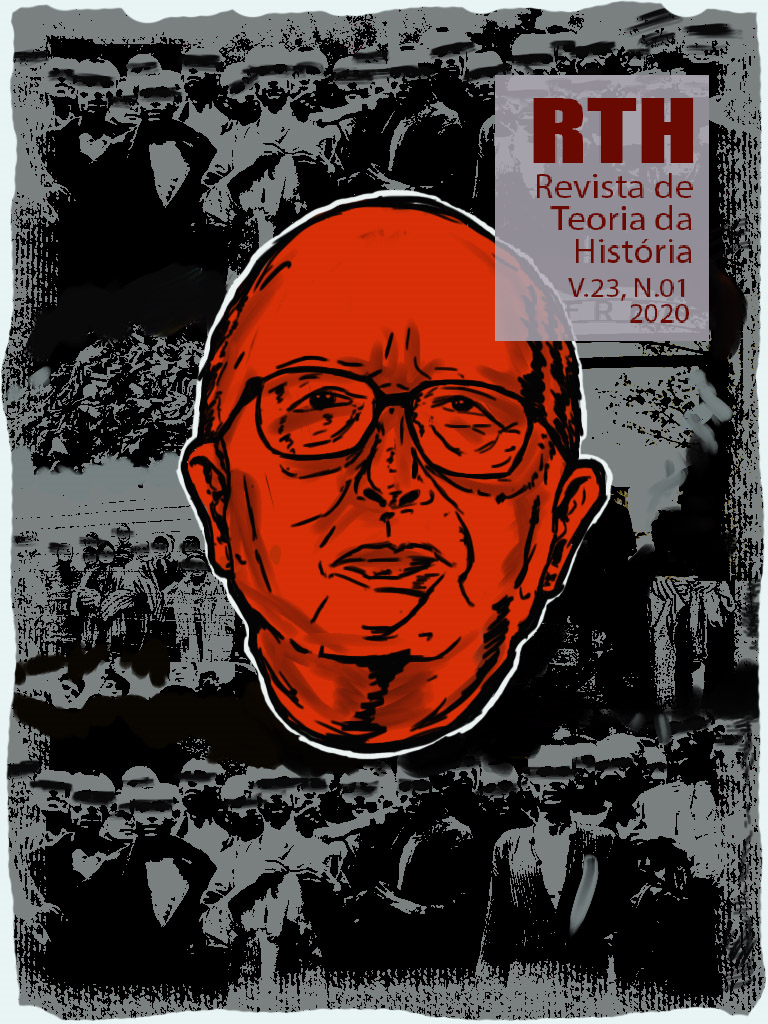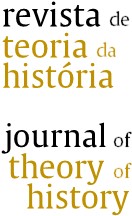Uma análise das histórias dos Tribunais de Crimes de Massa
Introdução a Writing History in International Criminal Trials
DOI:
https://doi.org/10.5216/rth.v23i1.64712Palavras-chave:
Direito penal internacional; História e Direito; Tribunais de crimes de guerra; antropologia do direitoResumo
Por que os tribunais penais internacionais escrevem histórias sobre as origens e causas dos conflitos armados? Com base em pesquisa empírica original com juízes, promotores, advogados de defesa e testemunhas especializadas em três tribunais penais internacionais, Writing History in International Criminal Trials, livro introduzido no presente artigo, procura entender como o direito e a história são combinados no tribunal. O testemunho histórico agora é parte integrante dos julgamentos internacionais, com promotores e equipes de defesa usando testemunhos históricos para atingir objetivos decididamente legais. No julgamento de Slobodan Milosevic, a promotoria procurou demonstrar intenção especial de cometer genocídio por referência a um animus de longa data, alimentado dentro de uma mentalidade nacionalista. Por sua parte, a defesa convocou historiadores como testemunhas para minar as acusações de responsabilidade superior e para mitigar a sentença, representando os crimes como represálias. Embora os modos legais de conhecer sejam distintos dos da história, os dois são efetivamente combinados em julgamentos internacionais de uma maneira que nos desafia a repensar a relação entre direito e história.
Referências
ARENDT, Hannah. Eichmann in Jerusalem: a report on the banality of evil. Revised and Enlarged edition. NY: Viking Press, 1965 (1963).
BASS, Gary Jonathan. Stay the Hand of Vengeance: The Politics of War Crimes Tribunals. Princeton: Princeton University Press, 2000.
BOAS, Gideon. The Milosevic Trial: Lessons for the Conduct of Complex International Criminal Proceedings. Cambridge: Cambridge University Press, 2007.
BLATTMANN, René; BOWMAN, Kïrsten. Achievements and Problems of the International Criminal Court. Journal of International Criminal Justice. 6(4), 2008, p. 711 730.
BLOXHAM, Donald. Genocide on Trial: War Crimes Trials and the Formation of Holocaust History and Memory. Oxford: Oxford University Press, 2001.
BOGATI, Vjera. Brdanin Trial, Tribunal Update No. 298, Institute for War and Peace Reporting, London. 27 31, January, 2003.
BORAINE, Alex. A Country Unmasked. Oxford: Oxford University Press, 2001.
BORNEMAN, John. Settling Accounts: Violence, justice and accountability in postsocialist Europe. Princeton: Princeton University Press, 1997.
BRITO, Barahona, et al. (org.). The Politics of Memory. Oxford: Oxford University Press, 2001. BUUR, Lars. The South African Truth and Reconciliation Commission: A Technique of Nation-State Formation. In: Hansen, T.B. and Stepputat, F. (org.). States of Imagination: ethnographic explorations of the postcolonial state. Durham and London: Duke University Press, 2001.
CLARKE, Kamari. Fictions of Justice: The International Criminal Court and the Challenge of Legal Pluralism in Sub Saharan Africa . N ew York: Cambridge University Press, 2009.
DEMBOUR, Marie-Bénédicte, HASLAM, Emily. Silencing Hearings?Victim-Witnesses at War Crimes Trials. European Journal of International Law. Vol. 15, No. 1, 2004, pp. 151-177.
DEMBOUR, Marie-Bénédicte; KELLY, Tobias. Paths to International Justice: Social and Legal Perspectives. Cambridge: Cambridge University Press, 2007.
DIXON, Rosalind. Rape as a Crime in International Humanitarian Law: where to from here. European Journal of International Law. Vol. 13, No. 3, 2002, p. 697-719.
DOUGLAS, Lawrence. The memory of judgment: making law and history in the trials of the Holocaust. New Haven: Yale University Press, 2001.
DOUGLAS, Lawrence. Film as Witness: Screening 'Nazi Concentration Camps' before the Nuremberg Tribunal. The Yale Law Journal , vol. 105, No. 2, November 1995, p. 449 481.
DUFFET, Claire. Khmer Rouge Genocide Tribunal Stumbles as French Defense Lawyer Demands New Translation. Law.com , International News Section, 10 Dece mber 2008, Disponível em: http://www.law.com/jsp/law/international/.
DRUMBL, Mark. A. Atrocity, Punishment and International Law. Cambridge: Cambridge University Press, 2007.
ELTRINGHAM, Nigel. Accounting for Horror: post genocide debates in Rwanda. Lond on: Pluto Press, 2004.
EVANS, Richard J. History, Memory and the Law: the Historian and Expert Witness. Witness.” History and Theory , v. 41 (3), 2002, p. 326 345.
FRIEDLANDER, Saul (org.). Probing the Limits of Representation. Cambridge: Harvard University Press, 1993.
GEERTZ, Clifford. Fact and Law in Comparative Perspective. In: Local Knowledge: Further essays in interpretative anthropology. New York: Basic Books, 1983.
GOLSAN, Richard J. (org.). The Papon Affair: memory and justice on trial. New York: Routledge, 2000a.
GOLSAN, Richard J. History and the Duty to Memory ” in Postwar France: the pitfalls of an ethic of remembrance. In: MARCHITELLO, Howard (org.). What Happens to History: the renewal of ethics in contemporary thought. New York: Routledge, 2000b.
GOODALE, Mark; MERRY, Sally Engle. The Practice of Human Rights: Tracking Law Between the Global and the Local . New York: Cambridge University Press,
HAGAN, John. Justice in the Balkans: Prosecuting War Crimes in the Hague Tribunal. Chicago: University of Chicago Press, 2003.
HAZAN, Pierre. Justice in a Time of War: The True Story Behind the International Criminal Tribunal for the Former Yugoslavia. Translated by James Thomas Snyder. College Station: Texas A&M Press, 2004.
KITTICHAISAREE, K. International Criminal Law. Oxford: Oxford University Press, 2001.
KLARIN, Mirko. The Impact of the ICTY Trials on Public Opinion in the former Yugoslavia. Journal of International Criminal Justice. v. 7 (1), 2009, p. 89 96.
MARRUS, Michael. Nuremberg War Crimes Trial of 1945 6. Boston: Bedford Press, 1997.
MERTUS, Julie. Truth in a Box: the Limits of Justice Through Judicial Mechanisms. In: The Politics of Memory: Truth, Healing and Social Justice , ANNAIM, Abdullahi; AMADIUME, Ifi (org.). New York: Zed Books, 2000, p. 142 161.
MERRY, Sally Engle. Human Rights and Gender Violence: Translating International Law into Local Justice. Chicago: University of Chicago Press.
MINOW, Martha. Between Vengeance and Forgiveness: facing history after gen ocide and mass violence. Boston, Mass.: Beacon Press, 1998.
NETTELFIELD, Lara. Courting Democracy in Bosnia and Herzegovina: The Hague Tribunal’s Impact in a Postwar State. Cambridge: Cambridge University Press, 2010.
NUIJTEN, Monique; ANDERS, Gerhard (org.). Corrup tion and the Secret of Law A Legal Anthropological Perspective . Farnham: Surrey: Ashgate, 2009.
OSIEL, Mark. Mass Atrocity, Collective Memory and the Law. New Brunswick, NJ: Transaction. Paperback reprint, 2000 (1997).
PAREKH, Serena. A meaningful place in the world: Hannah Arendt on the nature of human rights.rights.” Journal of Human Rights v. 3 [1], 2004, p. 41 54.
PEEL, Quentin. Lessons for prosecutors of war crimes trials. Financial Times, March 13, 2006.
PESKIN, Victor. Beyond Victor's Justice? The Challenge of Prosecuting the Winners at the International Criminal Tribunals for the Former Yugoslavia and Rwanda. Journal of Human Rights, v. 4:2, 2005, p. 213-231.
ROSS, Alex. Watching for a Judgment of Real Evil. The N.Y. Times, 12 Nov. 1995, at 37.
ROSS, Fiona C. Bearing Witness: Women and the Truth and Reconciliation Commission in South Africa. London: Pluto Press, 2002.
SADKOVICH, James J. Argument, Persuasion and Anecdote: the usefulness of history to unde rstanding conflict. Polemos . 1 2, 2002, p. 33 49.
SARAT, Austin, DOUGLAS, Lawrence, UMPHREY, Martha Merrill. How Law Knows. Stanford: Stanford University Press, 2007.
SAXON, Dan. Exporting Justice: Perceptions of the ICTY Among the Serbian, Croatian, and Muslim Communities in the Former Yugoslavia. Journal of Human Rights, v. 4, 2005, pp. 559.
SCHIFF, Benjamin N. Building the International Criminal Court. Cambridge: Cambridge University Press, 2008.
SIMPSON, Gerry J. Didactic and Dissident Histories in War Crimes Trials. Albany Law Review. v. 60 (3), 1997, p. 801 839.
STOVER, Eric. The Witnesses: War Crimes and the Promise of Justice in The Hague. Philadelphia: University of Pennsylvania Press, 2005.
STOVER, Eric, WEINSTEIN, Harvey. My Neighbor, My Enemy: Justice and Community in the Aftermath of Mass Atrocity. Cambridge: Cambridge University Press, 2004.
TAMANAHA, Brian. On the Rule of Law: History, Politics, Theory. Cambridge: Cambridge University Press, 2004.
TODOROV, Tzvetan. “The Touvier Affair”. In: GOLSAN, R. J. (org.). Memory, the Holocaust and French Justice: the Bousquet and Touvier Affairs. Dartmouth: University Press of New England, 1996, p. 114-121.
TOSH, Caroline. Does Krajisnik Sentence Set Dangerous Precedent? In: IWPR Tribunal Update. No. 479, December 1, 2006.
TOSIC, Jelena. ‘Transparent Broadcast? The Reception of Milosevic's Trial in Serbia. In: DEMBOUR, M.-B. and KELLEY, T. (org.), Paths to International Justice: Social and Legal Perspectives. Cambridge: Cambridge University Press, 2007.
WARRELL, Helen; ANDERSON, Janet. Hague Court’s Record Under Scrutiny. Institute for War and Peace Reporting Tribunal Update No. 444, Part 2, March 17, 2006.
WIEVIORKA, Annette. France and Trials for Crimes Against Humanity. In: SARAT, A., DOUGLAS, Lawrence, UMPHREY, Martha (org.). Lives in the Law. Ann Arbor: University of Michigan Press, 2002, p. 215 231.
WILSON, Richard Ashby. The Politics of Truth and Reconciliation in South Africa: legitimizing the post apartheid state . Cambridge: Cambridge University Press, 2001.
WILSON, Richard Ashby. Writing History in International Criminal Trials. Cambridge: Cambridge University Press, 2011. [Selecionado para a categoria "Outstanding Academic Title” pela American Library Association].
WOOD, Nancy. Vectors of Memory: legacies of trauma in Postwar Europe. Oxford: Berg, 1999.
Downloads
Publicado
Como Citar
Edição
Seção
Licença
A Revista publica única e exclusivamente artigos inéditos. São reservados à Revista todos os direitos de veiculação e publicação dos artigos presentes no periódico.
Licensed under a Creative Commons Attribution-NonCommercial-NoDerivatives 4.0 International License



